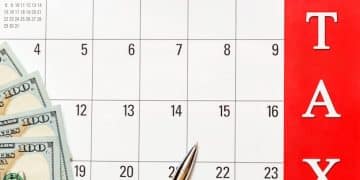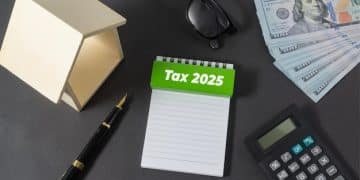Don’t Miss Out: Claim Expiring Tax Benefits Before December 31st

Don’t Leave Money on the Table: Claim These Expiring Tax Benefits Before December 31st by understanding which tax credits and deductions are ending soon and taking action to secure them, potentially leading to significant savings on your tax bill.
Time is running out to claim valuable tax benefits! Don’t Leave Money on the Table: Claim These Expiring Tax Benefits Before December 31st by taking advantage of expiring tax credits and deductions can significantly lower your tax liability for the year.
Expiring Tax Benefits: A Last-Minute Opportunity
As the year draws to a close, it’s crucial to review potential tax benefits that may be expiring. Many credits and deductions have specific deadlines, and missing them means losing out on potential savings. Let’s explore some key expiring tax benefits and how to claim them before December 31st.
Understanding Tax Credits and Deductions
Before diving into specific expiring benefits, it’s important to understand the difference between tax credits and deductions. Tax credits directly reduce your tax liability, dollar for dollar. Deductions, on the other hand, reduce your taxable income, which in turn lowers your tax liability. The impact of a deduction depends on your tax bracket.
- Tax credits provide a dollar-for-dollar reduction of your tax bill.
- Tax deductions reduce your taxable income, lowering your tax liability.
- Some benefits are permanent, while others are temporary and may expire.
Knowing these distinctions is crucial when planning your end-of-year tax strategy. Take the time needed to do it well so that you dont miss out.
Key Expiring Tax Benefits to Watch
Several tax benefits are set to expire soon, making it crucial to act quickly to claim them. These benefits can provide significant savings for individuals and businesses alike. We will look at a few to make sure that we dont miss out.
The Energy-Efficient Home Improvement Credit
This credit is designed to encourage homeowners to make energy-efficient improvements to their homes. It can cover expenses related to renewable energy sources and energy-saving equipment.
The Tuition and Fees Deduction
This deduction allows eligible taxpayers to deduct qualified tuition and related expenses paid for themselves, their spouse, or their dependents. It can help offset the costs of higher education.
- The Energy-Efficient Home Improvement Credit encourages energy-saving home upgrades.
- The Tuition and Fees Deduction helps offset higher education costs.
- Check eligibility requirements to ensure you qualify for these benefits.
It is important to consult with a tax advisor or refer to official IRS publications for the most up-to-date information.
Maximizing Your Tax Savings: Strategies and Tips
To maximize your tax savings before the December 31st deadline, consider implementing some strategic planning and taking advantage of available resources. Let’s get into some tips and tricks to save!

Reviewing Your Financial Records
Start by gathering and reviewing all your financial records, including income statements, receipts, and expense reports. This will help you identify potential deductions and credits.
Consulting with a Tax Professional
Seeking guidance from a qualified tax professional can be invaluable. They can provide personalized advice and help you navigate complex tax laws.
By staying organized and seeking professional advice, you can significantly increase your chances of claiming all eligible tax benefits. Don’t hesitate to ask for personalized tax advice if needed.
How to Claim Expiring Tax Benefits
Claiming expiring tax benefits typically involves specific forms and procedures outlined by the IRS. Understanding these requirements is essential to avoid errors or delays in processing your return. Lets look at how to do this process.
Filing the Correct Tax Forms
Each tax credit and deduction has its own designated form. Make sure you use the correct form and fill it out accurately. Some popular forms can easily be found on the IRS website.
Meeting Documentation Requirements
Supporting documentation, such as receipts and invoices, is often required to substantiate your claims. Keep these documents organized and readily available when filing your return.
- Filing the correct tax forms is essential for claiming benefits.
- Meeting documentation requirements ensures your claims are valid.
- Seek assistance from a tax professional if you need help with the process.
Remember to follow all IRS instructions and deadlines to ensure your claims are processed smoothly.
Common Mistakes to Avoid When Claiming Tax Benefits
Claiming tax benefits can be complex, and it’s easy to make mistakes that could cost you money or lead to penalties. Being aware of common errors can help you avoid them and ensure your tax return is accurate. In this section, we will look at some mistakes.
Incorrectly Calculating Deductions or Credits
Miscalculating the amount of a deduction or credit is a common mistake. Double-check your calculations and use reliable resources or tools to ensure accuracy.
Missing the Filing Deadline
Failing to file your tax return by the deadline can result in penalties and interest charges. Mark the deadline on your calendar and submit your return on time.

Avoiding these common mistakes can save you time, money, and headaches in the long run. If you have any doubts or concerns, consult with a tax professional for guidance.
Resources for Finding and Claiming Tax Benefits
Numerous resources are available to help you find and claim tax benefits, including official government websites, tax preparation software, and professional tax advisors. Taking advantage of these resources can simplify the process and ensure you claim all eligible benefits. In this section, we will cover a couple of resources!
IRS Website and Publications
The IRS website is a comprehensive source of information on tax laws, regulations, and forms. Explore the website and download relevant publications for guidance.
Tax Preparation Software and Tools
Tax preparation software can help you navigate the complexities of tax filing and identify potential deductions and credits. Choose a reputable software program that suits your needs.
By utilizing these resources, you can empower yourself to make informed decisions and maximize your tax savings. Taking the time to get informated is worth it.
Future of Tax Benefits: What’s on the Horizon?
The landscape of tax benefits is constantly evolving, with new laws and regulations being enacted regularly. Staying informed about potential changes can help you plan for the future and adapt your tax strategy accordingly. The future of tax benefits is ever changing!
Potential Changes to Tax Laws
Keep an eye on proposed changes to tax laws that could impact your eligibility for certain benefits. Stay informed about legislative updates and policy developments.
Implications for Tax Planning
Consider how changes in tax laws could affect your long-term financial planning. Adjust your strategies as needed to align with the evolving tax landscape.
- Stay informed about potential changes to tax laws.
- Consider the implications of these changes for your tax planning.
- Consult with a tax professional for personalized advice.
By staying proactive and adaptable, you can position yourself to take advantage of future tax benefits and minimize potential risks.
| Key Point | Brief Description |
|---|---|
| ⏰ Expiring Benefits | Claim tax benefits before December 31st. |
| 🧾 Tax Records | Review financial records to identify potential deductions. |
| 🧑💼 Tax Pro | Consult a tax professional for personalized advice. |
| ✅ Correct Forms | File the correct forms and meet documentation needs. |
Frequently Asked Questions
▼
If you miss the deadline, you generally won’t be able to claim the expiring tax benefits for that tax year. It’s crucial to act before the end of the year.
▼
Eligibility requirements vary for each tax benefit. Review the IRS guidelines or consult with a tax professional to determine if you qualify based on your circumstances.
▼
Tax forms are available on the IRS website. You can download them directly from the site, or tax preparation software can help you select the right ones.
▼
Documentation requirements vary depending on the specific tax benefit. Generally, you’ll need receipts, invoices, and other records to support your claims. Keep these documents organized.
▼
Hiring a tax professional can be beneficial, especially if you have a complex tax situation or are unsure about claiming specific benefits. They can provide personalized guidance and ensure accuracy.
Conclusion
In conclusion, claiming expiring tax benefits before December 31st is a savvy move that can significantly reduce your tax liability. Ensure you review your financial records, seek professional advice when needed, and file the correct forms with supporting documentation. Act now and to reap your benefits!





